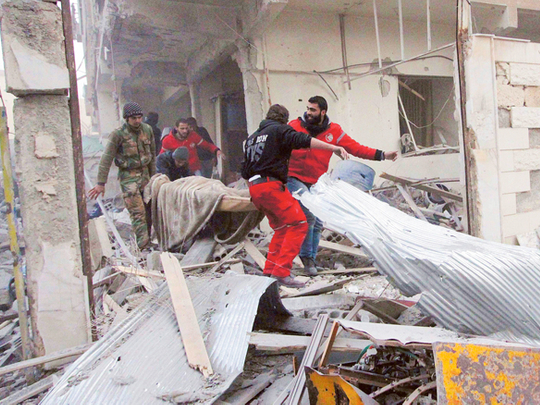
Beirut: An ambivalent US response to a Moscow peace conference on Syria, despite a firm boycott by the main opposition, shows how the fight against Daesh fighters has considerably reduced international pressure on President Bashar Al Assad.
Nearly four years into a war that has already killed more than 200,000 people and displaced millions, even the Russian hosts accept there is little chance of a breakthrough at the conference, which has been spurned by most opposition groups.
Moscow says the aim of the conference is to find ways to restart peace talks that collapsed in Geneva last year.
Russia’s longstanding proposals for a peace plan do not require Al Assad to leave power, which Al Assad’s main opponents consider the basis for any talks.
The United States — still publicly committed to removing Al Assad — might once have been expected to denounce a conference held on such a basis as a sham.
But since launching a military campaign last year against the hardline Daesh group in Syria and Iraq, Washington is now less focused than before on seeking Al Assad’s downfall. It has not objected to the Moscow talks, and Secretary of State John Kerry said he hopes they can prove useful.
Al Assad himself, speaking to a Czech magazine in an interview published earlier this month, said the purpose of the conference is to discuss “the unity of Syria, containing terrorist organisations [and] supporting the army” — essentially his government’s agenda, yielding nothing to his opponents.
While some opposition figures could attend, it will be as individuals rather than representatives of major factions. Most are likely to hail from a Damascus-based official opposition tolerated by Al Assad and viewed as traitors by his armed enemies.
None of the main insurgent groups fighting on the ground have been invited.
The main opposition alliance, the Turkey-based National Coalition for Syrian Revolutionary and Opposition Forces, once touted by Western and Arab countries as a government in exile, is boycotting. It denounced the host Russia as a country that “supports the atrocities the Syrian regime is committing”.
Yet Washington has held back from supporting the boycott.
“The message from the Americans was: it’s up to you — you can go or you can not go,” said Hisham Marwa, vice-president of the National Coalition.
The ambivalent US stance shows Washington “hasn’t changed its position that it wants Al Assad to go, it has just changed its priorities,” said Andrew Tabler, a senior fellow at the Washington Institute for Near East Policy.
While Washington still calls publicly for Al Assad’s downfall, it effectively relies on Al Assad to permit its planes to use Syrian air space to target Daesh positions.
The United States is also in talks with Iran, Al Assad’s other top ally, over Tehran’s nuclear programme, giving it another reason to put differences over Syria on the back burner.
There is no longer any serious peace process in place. In the four years of fighting, two UN mediators have hosted high profile conferences in Geneva, only to quit in frustration after their talks failed to yield meaningful progress.
A year after the last failed conference, the latest UN.
mediator, Steffan de Mistura, is no longer emphasising a political deal, instead seeking to broker local ceasefires to reduce the humanitarian impact of fighting on civilians.
“Except for the timid idea by De Mistura, no one has been talking about a political solution in Syria, so you have only heard about the local freezes and the Russia talks,” said Hassan Hassan, an analyst at Delma Institute in Abu Dhabi.
Like the Moscow talks, the de Mistura approach helps Al Assad by reinforcing the status quo, Hassan said. Local ceasefires could alleviate pressure on the government’s forces in Aleppo and Damascus.
Some diplomats say that even if the Moscow talks and De Mistura’s plan are unlikely to yield breakthroughs, they are worth pursuing. Al Assad will not leave power soon and there is a need to negotiate with his government, they say.
“The hard approach of not moving a millimetre is not going anywhere,” said a Western diplomat whose government backs more engagement with Syria to ease the crisis. “The destruction is so immense and nothing is happening at the moment apart from this.”













